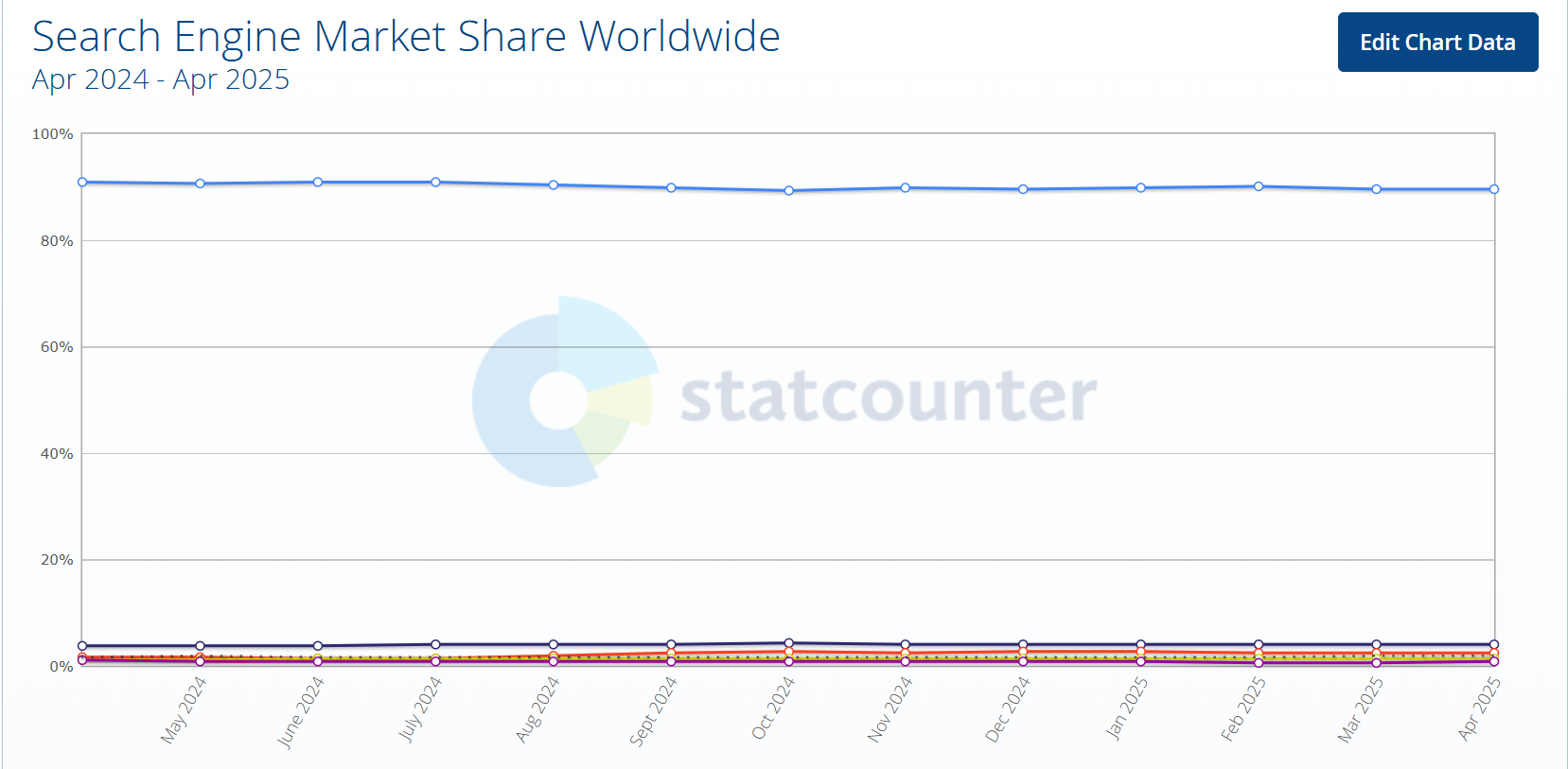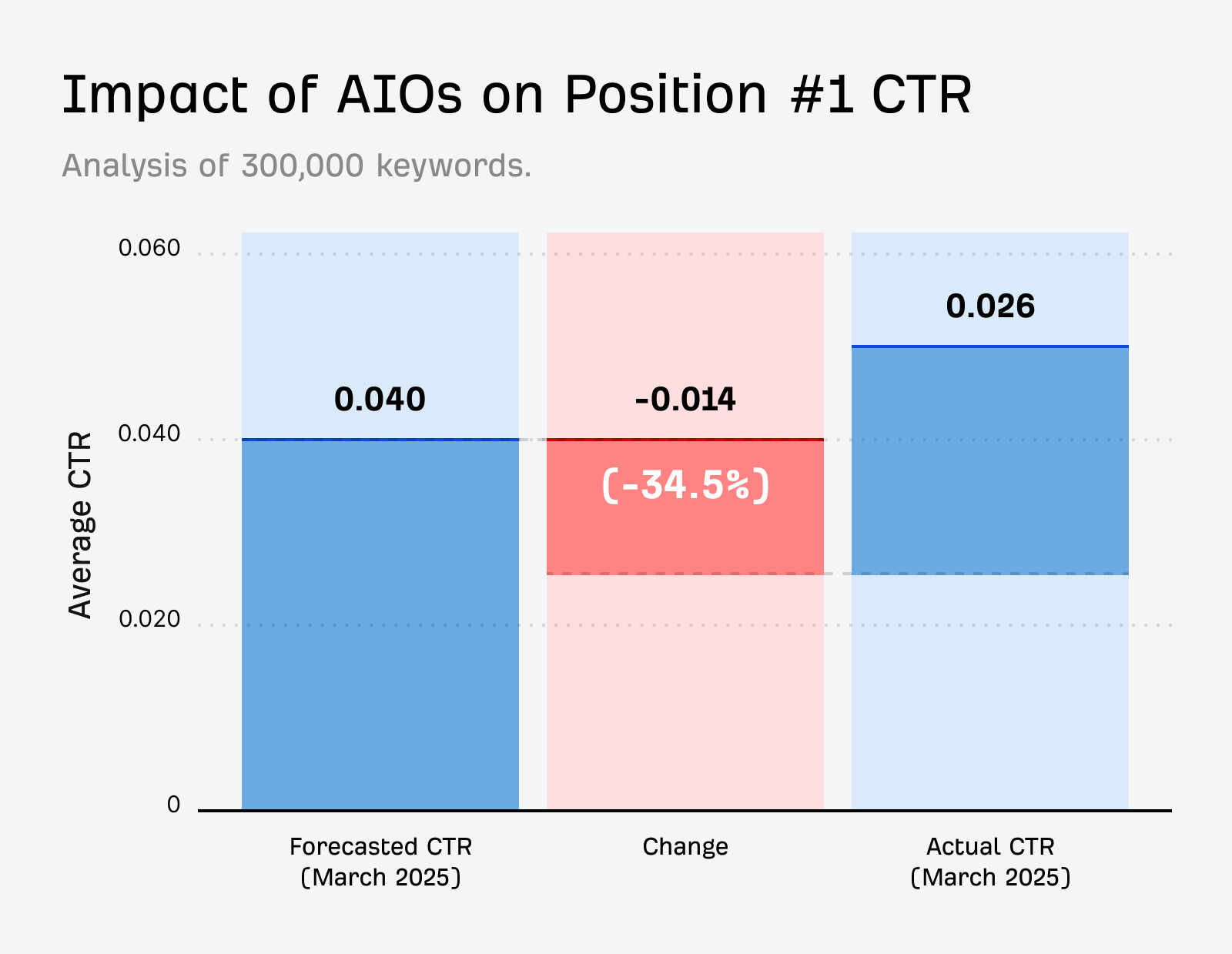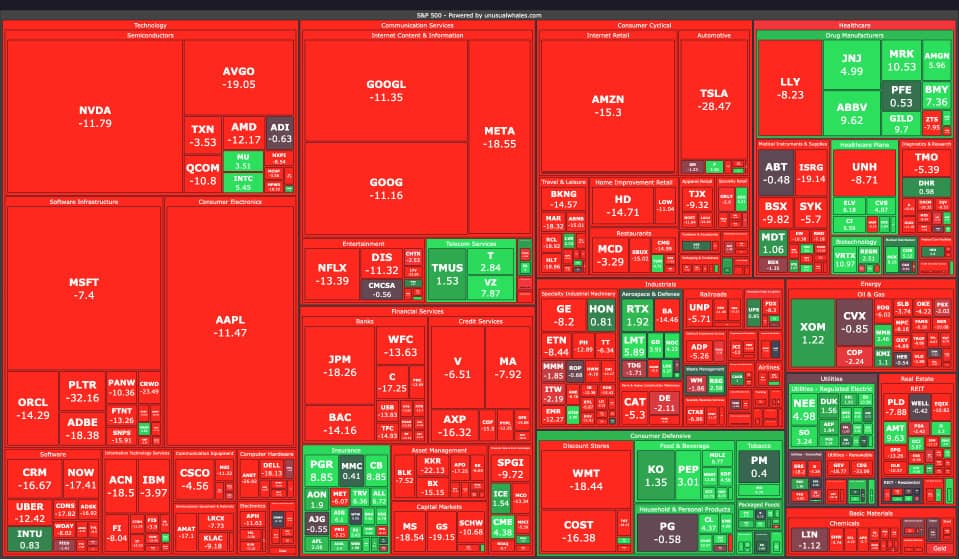Someone on social media joked that with the way the adoption of AI is going, only the politicians will not fear losing their jobs.
Related to this, Fortune Magazine published a report (available on Yahoo Finance) about a software engineer who lost his $150,000 job to AI and now works for DoorDash to make ends meet.
Many people believe such a story is only the first of many more to come.
The fear has especially been palpable in the world of SEO and content marketing. This is understandable since GenAI (which can respond to search queries in seconds), led by ChatGPT, was the first step in the democratization of artificial intelligence.
Two statistics show why this fear may not be misplaced. First, for the first time since 2015, Google’s share of the search market fell below 90% in September 2024, as Search Engine Land reported. At the time of writing, it is at 89.66%, according to StatCounter, a web analytics platform.
Search Engine Market Share Worldwide

Source: StatCounter
Second, the presence of AI overviews in search results reduces the clickthrough rate (CTR) of the top-ranking page by an average of 34.5%, according to a study by Ahrefs, a SEO software company.
Impact of AI Overviews on Position #1 CTR

Source: Ahrefs
If more people are replacing Google with GenAI platforms, and Google’s AI tool is reducing the CTR of top-ranking pages, does that not spell the beginning of the end of SEO and content marketing?
Well, it depends on who you are asking.
In what follows, we consider how various marketers have answered this question (and similar ones), from the optimistic ones to the pessimistic ones, through the realists.
The optimists: SEO and content marketing are here to stay
It’s important to clarify upfront that the optimists are not those who close their eyes to current developments and just hope that they will have a job in the coming years.
No!
While recognizing the changing dynamics, they also recognize that current SEO best practices are largely well adapted to cope with the emergence of GEO (Generative Engine Optimization). Said differently, they believe that the intersection between sound SEO and GEO is so big that undue apprehension is largely ill-advised.
“No—ChatGPT, AI Overviews, and other AI search engines will not replace SEO,” according to Pure SEO, a marketing agency. “Instead, they’re reshaping the way we think about visibility.”
This is because they believe that the same skill sets are required to excel in both worlds
“SEO and GEO aren’t separate skill sets—they’re two sides of the same coin. As AI-driven search becomes more sophisticated, marketing specialists will need to be proficient in both to create full-funnel digital strategies that maximise visibility across search engines and AI-generated platforms.”
Anyone who already does great SEO is already 90% of the way to what large language models (LLMs) favor, according to Nik Vujic, the CEO of Get Stuff Digital, a demand search agency. What do they favor? There are at least five, according to him:
- Real citations
- Authority from large, established domains
- Product comparisons, feature breakdowns, and listicles
- Original research
Since these should already be a part of sound SEO, he believes the leap required to do sound GEO is not large. “The overlap between LLM visibility and search optimization is massive,” he said. “The only shifts? Content format and understanding where LLMs pull data from.”
“SEO is not fucking dying – the same tagline has been around for 15+ years,” was the response of Daniel Foley Carter, a director at Assertive, a Global SEO agency, to the current fears. “Search as a model is changing and so as SEOs we take stock and adapt, except, Google’s own ‘latest’ guidelines are NO FUCKING DIFFERENT to how they have been for years.” Some of these guidelines include:
- Make content accessible (robots, internal links, render)
- Make good content not shit content (unique, e-e-at, blah blah blah)
- Offer a good user experience
Similarly, the need to create educational content, irrespective of where that content is found, remains even in the world of AI. “AI search is rising,” said Victor Eduoh, the CEO of VEC Studio, a SaaS content marketing agency. “People may not always land on your blog homepage. But that doesn’t mean we stop educating. It means we double down on creating content worth discovering—in search, in feeds, in AI outputs.”
Since AI models depend on content already available on the web, he believes that creating quality content, with a framework he calls “product-led storytelling,” remains a good marketing strategy in AI land.

The realists: SEO and content marketing must adapt
The main differences between the optimists and the realists pertain to the scope of disruption AI will introduce and the scale of changes that will be required to adapt to GEO.
Pure SEO said that the same skill sets are required, while Vujic believes most good SEOs are already doing 90% of what GEO requires.
The realists are not that confident.
“I don’t think SEO is dead,” said Ross Simmonds, CEO of Foundation Marketing, a marketing agency, in response to the recent release of Google’s AI Mode. “But yes… I’m confident that the strategies that have worked in the past are getting close to their expiration date.”
Do you see the difference?
While optimists believe that the intersection of the two sets contains many elements, realists believe that those elements are few. In Simmonds’ case, he believes the key fundamental marketers must embrace is creating content worth marketing:
“Remember that content marketing is a two-word industry. It’s not just about creating mediocre content with AI tools. It’s about creating content worth marketing.“
Google’s AI Mode means that SEO has now become harder, according to Ben Goodey, the founder of Spicy Margarita, a marketing agency. The personalization that this new tool will introduce requires:
- Hyperpersonalized SEO content marketing: topic clusters dedicated to ICPs, landing pages dedicated to niche use cases, and product documentation explaining all product features
- Renewed focus on bottom of the funnel (BOFU) content (comparison pages, use case pages, help center docs)
- Great content combined with good product marketing
- A good knowledge of the pain points and use cases of audiences and the mindsets of ideal customer profiles (ICPs)
Of course many would argue that good SEO was already going towards this direction, but realists can reply that the growth of GenAI has added a new urgency. Thus, SEOs and content marketers must pull out tools they don’t possess as they adapt to the new normal.
One of the areas receiving much attention is branding. For example, branded keywords with AI overviews saw an 18.68% increase in CTR, according to Neil Patel, the founder of Neil Patel Digital, a digital marketing agency.
Similarly, brand mentions are seen as a big factor in GEO. “AI systems are hungry for high-quality, context-rich signals when generating answers,” according to Search Engine Land. “Brand mentions in trusted publications are now critical to building topical authority and entity recognition.”
They also pointed to a study by Kevin Indig, a product-led growth expert, which shows that there is a correlation between brand search volume and brand mentions in LLMs.
Correlation Between Brand Search Volume and Mentions

Source: Growth Memo
Consequently, “new tools are emerging to help businesses understand how AI perceives their brands and products,” according to MarTech, a platform for marketing technology news and insights.
Another change is what Eric Siu, founder of Single Grain, a digital marketing agency, calls “search everywhere optimization” or SEO 2.0. People are searching across multiple platforms – TikTok, YouTube, Instagram, AI tools, and Google – and businesses must adapt to a kind of SEO that gives them cross-platform visibility.
“From my experience scaling digital presence across platforms, here’s the uncomfortable truth: if you’re still focusing solely on traditional SEO, you’re already behind,” said Siu. “The real opportunity lies in understanding and optimizing for this multi-platform search behavior.”
The pessimists: This is the beginning of the end
The pessimists are more likely to use the “SEO is dead” (or “keyword research is dead”) lingo. They tend to believe that the changes happening (and about to happen) are so radical that the whole concept of SEO needs a massive rethink.
“Google is smart, Google’s engineers are smart – you’re more likely to rank high with almost no text at all but a fabulous user experience matching the search intent, rather than optimized copy,” said Kate Bauman, a digital marketing specialist at Quartz Network, a platform helping executives succeed.
“Keyword research is dead,” she said. “You can’t focus on search engine bots and expect the user to also be satisfied, but you absolutely can rely on the search engines following along if you focus on the user.”
The whole concept of content marketing will give way to marketing strategies like events, branding, social, and advertising, according to Ryan Law, the director of content marketing at Ahrefs.
“In the next 10 years, the value of ‘educational blog content’ as a marketing strategy will go to zero,” he said. “Almost all informational queries will be resolved by LLMs in the places we already spend time: in our messaging and note-taking apps, in our email clients, in our social media feeds.”
But this development will not be the end of marketing as much as it will be the end of content marketing.
“Marketing existed before this strange little loophole appeared, and marketing will exist after,” he said. “The marketing strategies in ascendance today are not new or novel: events, branding, advertising, social. We are not abandoning the marketing playbook so much as cycling through it. Every marketing tactic is part of a cycle of adoption, saturation, and abandonment. Technology has accelerated this process, but the process has always existed.”
What should you do?
It seems that the best approach is to recognize that SEO is changing, identify what the changes are, and adapt to them.
While the optimists are right that there are commonalities between traditional SEO and GEO, the differences must not be understated to the point where marketers are so relaxed that they just keep holding on to the status quo. In this case, they should be willing to listen to the realists about what the new changes are and how to adapt to them.
However, realists and pessimists must not be too quick to dismiss sound SEO strategies, which Carter called the fundamentals. “High-quality content aligned with search intent and niche targeting still significantly impacts organic rankings and business growth,” according to Patel.
Thus, any blanket dismissal of content marketing will be premature. Instead, the focus should be on how content marketing needs to evolve in the world of “search everywhere optimization.” And as we have seen above, some of these discussions were already on the agenda even before the democratization of AI began.
Ultimately, SEOs and content marketers must stay on top of the latest trends and seek to apply new insights to their efforts. However, in an industry where fads come and go, marketers must be smart enough to separate the gold from the dross.
Thankfully, MarTech companies are already developing new analytics tools that will help marketers become more adept in this new world.
For example, SparkToro has already developed a tool that will help marketers identify which AI platforms their target audiences are using and the frequency of usage. MarTech also mentioned Waikay.io, a platform that helps marketers measure traffic from AI platforms as well as brand mentions.
As more of these tools develop, marketers will no longer be walking in the dark but will gain the clarity needed to thrive in the new world of search.



0 Comments